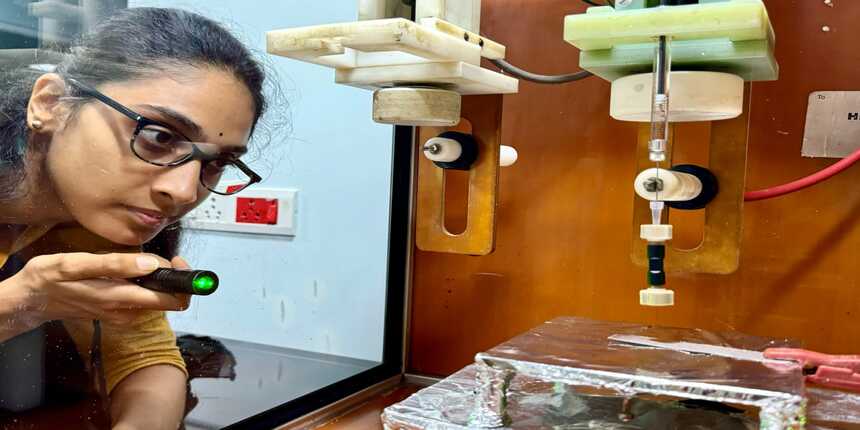IIT Madras researchers reveal water droplets break natural minerals to form nanoparticles
Careers360 Connect | June 3, 2024 | 03:16 PM IST | 2 mins read
IIT Madras researchers discovered that when hard minerals like river sand, ruby, and alumina are mixed with tiny charged water droplets, they break apart to generate nanoparticles.

NEW DELHI: Indian Institute of Technology Madras (IIT Madras) researchers have shown that ordinary minerals can be fragmented into corresponding nanoparticles by water microdroplets. This marks the debut of IIT Madras in the renowned 'Science' journal with their research paper.
As per the information on the official press release, Water droplets in the atmosphere, like clouds and fog, can acquire electric charges through the presence of ionic species and contact electrification. When minerals disintegrate, they create fresh surfaces where various types of catalytic reactions may take place, leading to the formation of new molecules.
According to the researchers, 'microdroplet showers' made of nanoparticles and molecules falling on Earth may have an impact on the planet's chemical and biological evolution.
Proton induced slip mechanism
During their experiment, they observed that fragments of hard minerals like river sand, ruby, and alumina, when immersed in small, charged water droplets, rapidly disintegrated to create nanoparticles within milliseconds. Subsequently, they gathered and analyzed these nanoparticles using sophisticated techniques. Computer simulations indicated that this phenomenon might occur through a mechanism known as 'proton-induced slip,' wherein atomic layers within the minerals shift relative to each other, facilitated by protons. It is noted that tiny water droplets contain protons and other reactive species, as confirmed by previous studies.
Speaking about the mechanism, Umesh V Waghmare said, “The phenomenon involves complex processes inherent to microdroplets of water, and understanding its mechanism will stimulate many fundamental scientific studies."
Impact on soil formation
As per the official press release, the swift weathering process could hold significance in soil development, particularly with the abundance of charged aerosols in the atmosphere. Soil formation typically occurs through the gradual weathering of rocks, a multifaceted process that traditionally takes 200-400 years to produce just one centimeter of soil, comprising particles of diverse sizes. Nanoparticles derived from minerals like silica play a pivotal role in fostering the growth of essential crops such as rice and wheat.
Research led by Thalappil Pradeep
The research was led by Thalappil Pradeep, professor in the chemistry department at IIT Madras, who is also a recipient of the Padma Shri award, along with B K Spoorthi, the primary author of the research paper, who has recently completed her PhD at IIT Madras. The computational aspect of the research was conducted by Koyendrila Debnath, under the guidance of Umesh V Waghmare from the Jawaharlal Nehru Centre for Advanced Scientific Research (JNCASR), Bengaluru, and the president of the Indian Academy of Sciences. The findings of the study were published in the science journal issue dated May 31.
Disclaimer: This content was distributed by IIT Madras and has been published as part of Careers360’s marketing initiative.
Follow us for the latest education news on colleges and universities, admission, courses, exams, research, education policies, study abroad and more..
To get in touch, write to us at news@careers360.com.